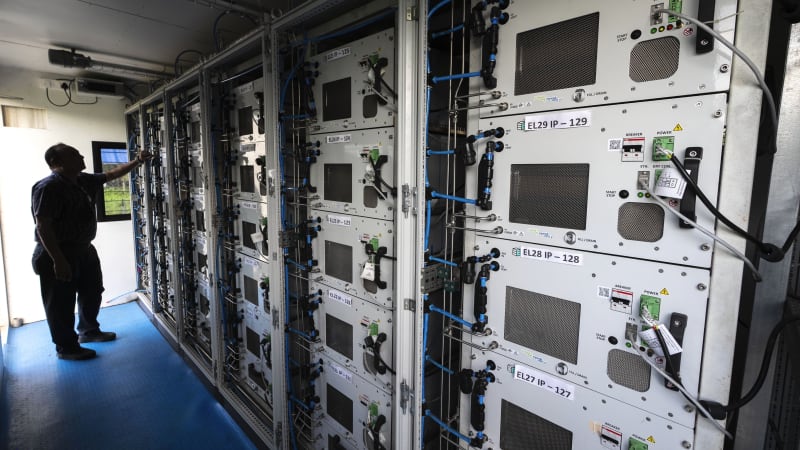Biden selects 7 hydrogen hubs across 16 states for $7 billion in U.S. grants

A manager at Oil India Limited checks readouts at a hydrogen plant in Jorhat, India. Green hydrogen is being touted around the world as a clean energy solution to take the carbon out of high-emitting sectors like transport and industrial manufacturing. (AP)
Hydrogen projects involving Amazon.com Inc., Exxon Mobil Corp. and Air Products and Chemicals Inc. are among those receiving portions of $7 billion in U.S. funding meant to make the country a leader in the controversial fuel.
President Joe Biden and Energy Secretary Jennifer Granholm officially announced the seven projects — stretching from Pennsylvania to California — that have been selected as recipients of the government backing during an event at the Port of Philadelphia. The administration said the port would use hydrogen from a hub proposed for portions of Pennsylvania, Delaware and New Jersey to fuel trucks and other heavy-duty equipment.
Biden on Friday hailed the investments as a boon for the economy, saying they would bring “good paying jobs” for union workers — a bloc that is crucial to his reelection bid — and help the U.S. address climate change.
“I made it a goal for our country to get to net-zero emissions from pollutants by 2050. By the way, it’s the only existential threat to humanity, if we don’t do stay below these numbers, the whole world is changing,” Biden said.
“Clean hydrogen is going to help us meet this goal. When it comes to charging our cars or powering our homes, all we need is clean electricity,” he added.
The Biden administration is throwing its weight behind hydrogen and the hubs — broad networks of hydrogen producers and consumers spanning multiple states — as part of its net-zero goal. While almost no hydrogen is currently produced in the U.S., that figure could increase to 10 million metric tons by 2030, according to an Energy Department report. The administration has started an effort to reduce costs — one of the biggest barriers to hydrogen’s widespread use — by 80% to $1 a kilogram by 2030.
“Hydrogen — you can power industries like the production of steel and aluminum,” Biden said. “That lets us get to this place without putting more carbon in the atmosphere.”
The Pennsylvania hub where the announcement was made will receive up to $750 million in funding and will use existing oil infrastructure to produce hydrogen from both renewable and nuclear energy, according to the White House. Project partners include refiner PBF Energy Inc. and Air Liquide SA.
Other winners include as much as $1.2 billion for a California-based project that will produce hydrogen exclusively from renewable energy and biomass and is aimed at decarbonizing public transportation, heavy-duty trucking and port operations. Project partners include Amazon and Air Products.
A hydrogen hub backed by Senator Joe Manchin spanning parts of West Virginia, Ohio and Pennsylvania that is partnering with natural gas producer EQT Corp., is receiving up to $925 million and will produce hydrogen using natural gas with carbon capture, according to the White House.
A Gulf Coast hydrogen hub centered in Houston and backed by companies including Exxon and Chevron Corp. was awarded as much as $1.2 billion. A hub proposed by a coalition of Midwest states that would be partially powered by nuclear energy to provide hydrogen for uses including steel and glass production was awarded up to $1 billion. Project partners include utility Exelon Corp. and reactor operator Constellation Energy Corp.
The hydrogen hub awards, which were funded in 2021’s bipartisan infrastructure law, mark the culmination of a furious race between states. The Energy Department in January urged 33 projects to submit full applications, after receiving 79 proposals.
In addition, the Biden administration has announced plans to award $1 billion to stimulate demand for hydrogen to provide “market certainty” and ensure demand.
Though hydrogen is a clean-burning source of power, it takes large amounts of energy to produce — and when it’s made with electricity from coal or natural gas, it has a bigger carbon footprint. Environmentalists have cautioned that a wave of hydrogen production could drive further demand for fossil-based electricity — and unleash more greenhouse gas emissions — if it isn’t made using clean power sources.
“With this first major step toward creating a hydrogen industry, the Biden administration must move with caution as it engages with communities to ensure hydrogen can be a part of our clean energy future,” said Ben Jealous, the Sierra Club’s executive director. “The fossil fuel industry is working to continue our nation’s reliance on fossil fuels by any means necessary — and hydrogen offers yet another possible inroad for Big Oil and Gas to lock in polluting and non-economic uses of gas for decades to come.”







